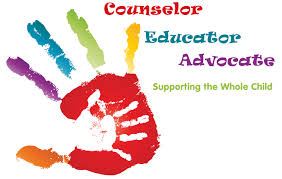
School Counselors are trained leaders, holding a minimum of a Masters Degree in education, who work collaboratively with students, families, teachers, staff, administrators, and the community to support student growth and promote their academic achievement. Our mission is to serve all students by partnering with them as they develop academic, career, and social-emotional skills that will allow them to reach their fullest potential.
Based on the American School Counselor Association’s National Model, comprehensive counseling programs deliver services directly and indirectly. What does this mean for your child? It means that I am dedicated to knowing each student in our building and to developing a positive relationship with them while paying close attention to how they are connecting to their learning opportunities. If a student is experiencing a barrier to learning or a difficulty in reaching their full potential, I help problem-solve, consult, and collaborate with those necessary to find solutions that empower each student to succeed. Your student may work with me through:
- School Counseling Curriculum: Using structured lessons driven by student outcomes, I visit each classroom weekly throughout most of the school year, providing lessons that foster social-emotional, academic, and career awareness and skills that are appropriate for their developmental level. This also allows me to get to know each student, work with teachers, and gain insight on the needs of various classrooms.
- Individual Counseling: Your student may work with me one-one-one in my counseling office by requesting a meeting, or by parent, teacher, or principal referral. In this event, my office is a safe place for students to explore and continue learning a variety of skills, such as problem-solving, communication, conflict-resolution, organization, anger management, self-awareness, goal-setting, and future planning.
- Small Group Counseling: Students may be selected to work in small groups with other students who are similar in developmental level and working through similar issues. Typical small groups include friendship, changing families, grief and loss, self-esteem, social-skills, anger management, or stress and anxiety management.
- Crisis response: In situations that call for immediate attention, I provide support to students, staff, and families through consultation, collaboration, and referrals to outside supports when necessary.
For additional information on the importance of elementary level school counselors, visit here.